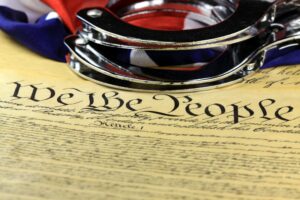
The 8th Amendment of the United States Constitution is an important part of the legal system that protects citizens from excessive government power. It prohibits excessive bail, excessive fines, and cruel and unusual punishment. To understand the significance of this amendment, we must first define the key terms: “excessive” refers to something that surpasses reasonable limits, “bail” is a sum of money set by the judge required for the release of an accused individual, and “fines” are monetary penalties imposed for offenses. This amendment raises an essential question: how does the Constitution regulate government powers to prevent abuse, particularly in the context of criminal justice? To explore this, we will first examine the meaning of excessive bail and fines, then consider examples of how the 8th Amendment has been applied, and finally, discuss how this amendment reflects the broader constitutional principles that regulate government powers.
Excessive Bail and Excessive Fines
The 8th Amendment’s prohibition of excessive bail people who are accused of a crime are from being subjected to unreasonable financial burdens as a condition of their release. Bail makes so people will not be deprived of their liberty without due process, and excessive bail goes against this principle by keeping people incarcerated simply because they cannot afford to pay. Excessive bail is disproportionately high compared to the severity of the alleged crime, effectively punishing the accused before a trial has even occurred.
Excessive fines, on the other hand, are penalties imposed by the government that are disproportionately severe in relation to the offense. These fines are meant to serve as both punishment and deterrence, but when they exceed reasonable limits, they can cause undue financial hardship and infringe on individual rights. For example, in the case of Timbs v. Indiana (2019), the Supreme Court ruled that the seizure of a $42,000 vehicle for a drug offense with a maximum fine of $10,000 was an excessive fine, violating the 8th Amendment. This ruling reinforced the idea that fines must be proportionate to the offense and not used as a means of oppression.
In essence, both excessive bail and excessive fines serve as checks on governmental power, ensuring that the legal system remains fair and just. These protections are vital for maintaining public trust in the justice system, preventing the state from using its power to punish individuals excessively or unfairly.
Examples of the 8th Amendment in Practice
The 8th Amendment has effects on numerous cases that illustrate its application. One of the most famous examples is the case of Furman v. Georgia (1972), where the Supreme Court held that the death penalty, as applied at the time, constituted cruel and unusual punishment and thus violated the 8th Amendment. This decision led to a temporary moratorium on the death penalty across the United States until states revised their capital punishment laws to address the concerns raised by the court.
Another example is Atkins v. Virginia (2002), where the Supreme Court ruled that executing individuals with intellectual disabilities is a violation of the 8th Amendment. This case highlighted the evolving standards of decency that must guide the interpretation of what constitutes cruel and unusual punishment.
Moreover, the 8th Amendment has been invoked in cases involving prison conditions, such as Brown v. Plata (2011), where the Supreme Court ordered the state of California to reduce its prison population due to overcrowding, which was deemed to cause cruel and unusual punishment. This case underscored the amendment’s role in protecting the dignity of individuals, even those who are incarcerated.
These examples demonstrate how the 8th Amendment serves in the protection of human rights and the regulation of government powers. It ensures that punishment remains humane and that the state cannot impose penalties that are arbitrary or excessive.
The Constitution Regulates Government Powers
The 8th Amendment is a key example of how the Constitution regulates government powers in the realm of criminal justice. By prohibiting excessive bail, excessive fines, and cruel and unusual punishment, the amendment sets clear limits on what the government can do in the name of justice. This reflects a broader constitutional principle that seeks to balance the need for order and security with the protection of individual rights.
The Constitution, through its various amendments and articles, establishes a system of checks and balances designed to prevent any one branch of government from becoming too powerful. The 8th Amendment specifically addresses the potential for abuse within the judicial system, ensuring that individuals are not subjected to punitive measures that exceed what is fair or just.
For instance, the requirement for bail to be reasonable prevents the government from using financial barriers to keep individuals in jail unnecessarily. Similarly, the prohibition of excessive fines ensures that the state cannot use its power to bankrupt individuals for minor offenses. These protections are crucial in a democratic society, where the rule of law must be tempered by justice and fairness.
The 8th Amendment plays a fundamental role in shaping the United States legal landscape, particularly in protecting individuals from excessive and unjust government actions. By prohibiting excessive bail, excessive fines, and cruel and unusual punishment, it ensures that the power of the state is exercised in a manner consistent with the principles of fairness and justice. These protections are not only important for maintaining the integrity of the legal system but also for upholding the broader constitutional framework that regulates government powers. In an era where the balance between security and liberty is often contested, the 8th Amendment remains a powerful reminder of the need to protect individual rights against potential government overreach.
This guest blog post was penned by our friends at Sportsmans Bail Bonds in Utah. For more information about their services and how they can help you if you run into trouble out west, head on over to their website.





